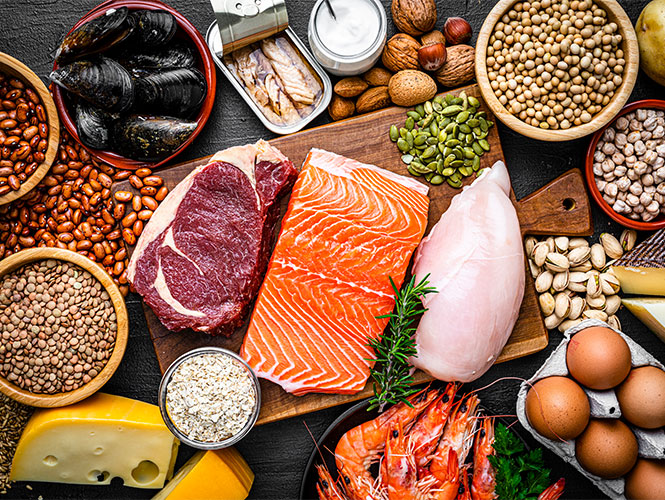System Dialog

Protein is an essential macronutrient made up of building blocks called amino acids, nine of which are considered essential amino acids. Essential amino acids are not produced by the body independently and we must consume them from our food choices. Protein supplies a source of energy and is essential for the growth and maintenance of cells and to carry out chemical reactions. Protein also has a higher thermic effect, which means that it requires more energy (calories) to digest and absorb protein. Because protein is digested more slowly than carbohydrates and fat, it can also help us to stay full for longer and can help with appetite control.
Protein is found in many different types of foods like animal sources, including meat, poultry, seafood, milk, cheese, yogurt and eggs and egg whites, and in some plant foods, including beans, lentils, soy, nuts, seeds, certain grains and vegetables. Animal sources of protein are considered “complete” protein because they contain all nine essential amino acids, whereas plant sources typically are lacking in at least one essential amino acid. Including plant proteins from different sources, along with all other food groups help to fill this gap.
The amount of protein we require is dependent on a variety of factors. For individuals most healthy individuals 0.36 grams per pound of body weight is considered adequate protein intake.
• For a person who weighs 130 pounds, this would mean consuming 47 grams of protein per day.
• For a person who weighs 200 pounds, this would mean consuming 73 grams of protein per day.
The acceptable range as a percentage of overall food intake is 10-35% of total calories from protein. Most people easily meet the recommended minimum amount of protein, but for some people, protein may need to be increased or decreased. Those who are highly active, pregnant or nursing, for example, will need to increase protein intake, while individuals who have chronic kidney disease may need to limit their protein intake. Individuals seeking weight loss may also benefit from increasing protein intake to help maintain muscle mass and help with hunger control.
— To support wound healing
— To support muscle maintenance during weight loss
— To help support muscle growth
— To support higher levels of exercise
— During illness/recovery
— During pregnancy or breastfeeding
While consuming a higher protein diet has some potential benefits, it’s essential to ensure that high protein intake does not come at the expense of other food groups. Variety in protein choices and ensuring all food groups are included in your eating plan, like meat and poultry, beans and lentils, dairy, vegetables and grains will help to ensure adequate intake of other essential nutrients, such as fiber, vitamins, minerals and antioxidants.
Aim to consume a variety of different proteins from different food groups. Choose mostly minimally processed, lean and plant-based protein sources. Some animal sources of protein can be high in saturated fat, which can contribute to higher cholesterol levels and increase the risk of heart disease.
Lean Meats: Extra lean ground beef (95% or leaner), sirloin, top loin, tenderloin, pork loin, pork tenderloin, pork chop, venison, bison
Poultry: Extra lean ground turkey (95% or leaner), skinless chicken breasts, skinless chicken thighs, skinless turkey breast
Seafood: Salmon, trout, mackerel, herring, tuna, cod, tilapia, scallops, crab, lobster, clams, oysters, mussels
Dairy & Eggs: Cottage cheese, low-fat cheese, lower-sugar low-fat Greek yogurt, plain, low-fat kefir, eggs & egg whites
Plant-Based Proteins: Beans and lentils, unsalted nuts or nut butters, edamame, tofu or tempeh, quinoa
Protein Supplements: Full Circle Market vanilla protein powder
— Blend low-fat yogurt or one scoop of protein powder with frozen fruit for a breakfast smoothie
— Pair a piece of fruit with string cheese or a handful of nuts
— Add beans or tofu to a salad for lunch
— Snack on steamed edamame or enjoy as an appetizer
— Replace milk in your cereal with yogurt or kefir
— Swap Greek yogurt instead of regular yogurt
— Boil eggs for a quick snack or breakfast
Hello! How can I help you today?